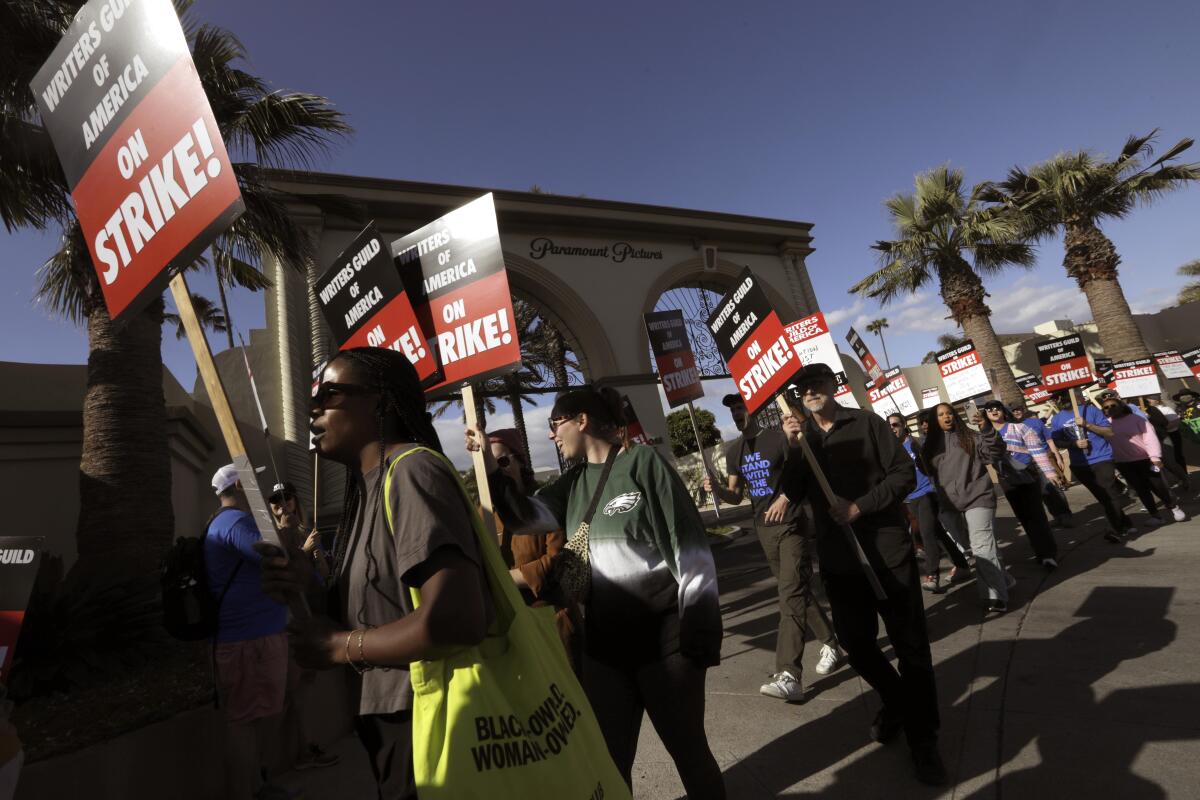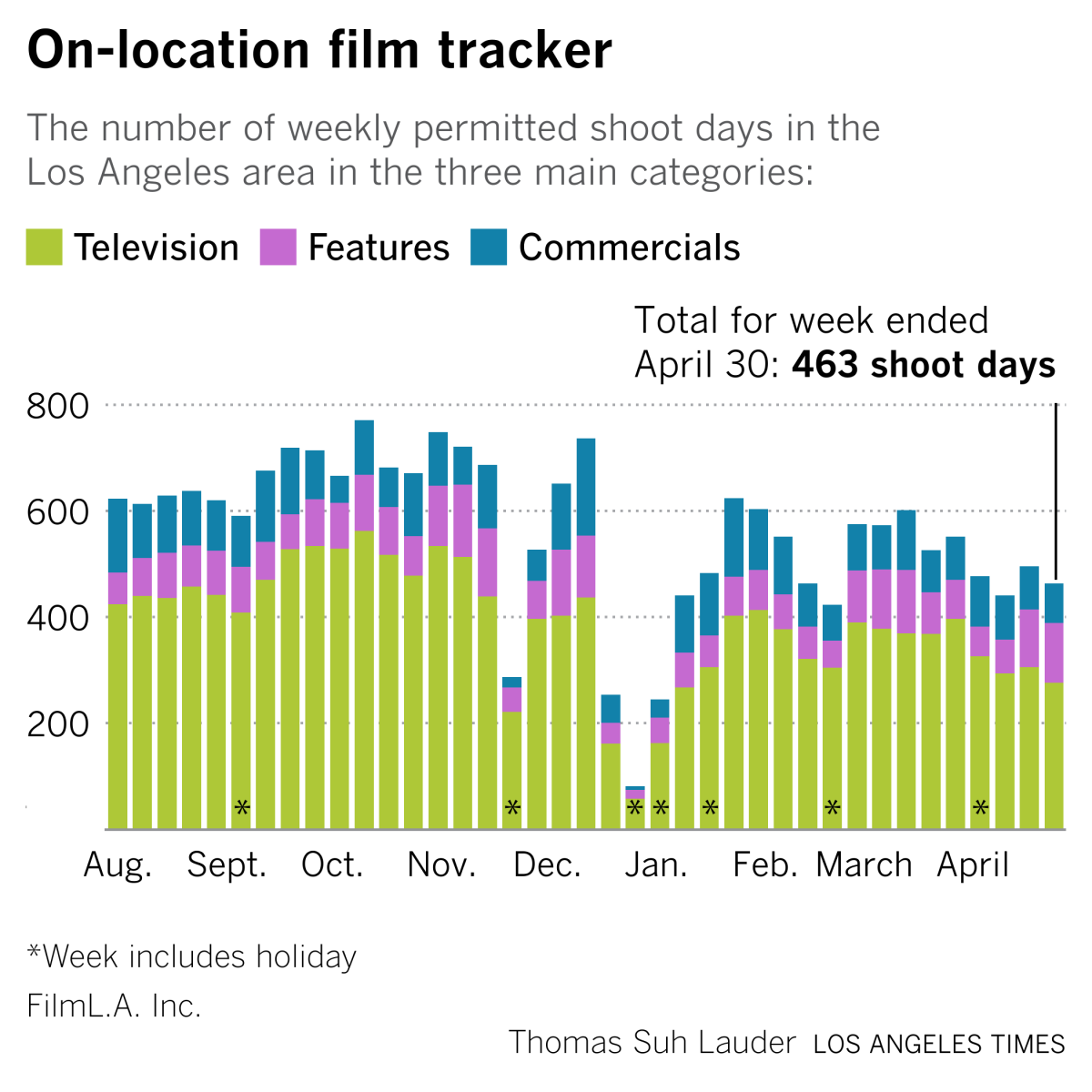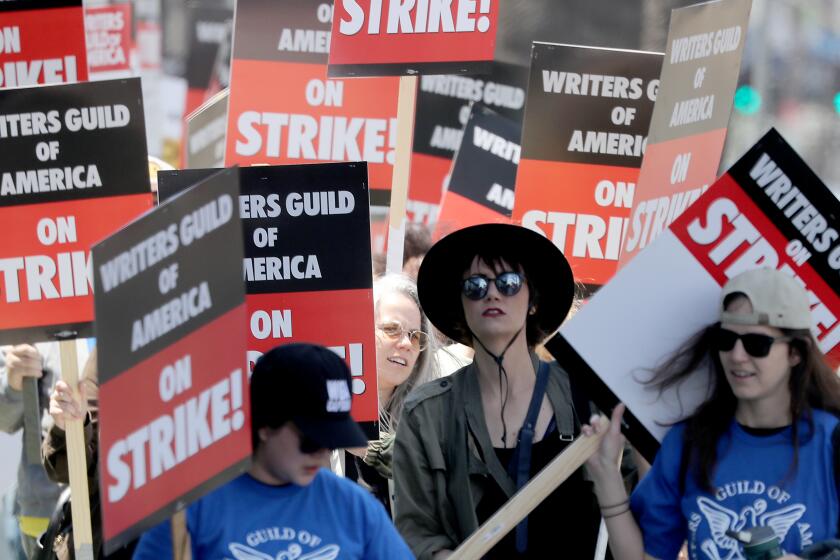Hollywood writers are on strike. Now what?

Welcome to the Wide Shot, a newsletter about the business of entertainment. Sign up here to get it in your inbox.
Well, it’s happening. The dreaded Hollywood writers strike of 2023 is upon us.
Any hope that the Writers Guild of America and the studio alliance would reach a new three year-deal — or even a temporary extension — to avoid today’s “pens down” moment was dashed Monday night in the hours before the midnight contract expiration.
The boards of directors for the East and West Coast divisions of the WGA voted unanimously to call a strike effective 12:01 a.m. Tuesday, the union said in a statement. That announcement came just minutes after the group that represents the studios in labor negotiations, the Alliance of Motion Picture and Television Producers, declared that talks had broken down.
So here we are, with picketing set to begin this afternoon in the first screenwriter walkout in 15 years.
This was not surprising, but still stunning because of its significance.
And I’ll say, watching this climax of labor strife unfold on the same night that bedazzled celebrities strutted down the Met Gala carpet in Fendi and Chanel was quite something.
If you want to know what led to this, please read our big pre-strike package.
What to know so far:
- ‘It’s just pure chaos’: Top Hollywood showrunners sound off about writers strike.
- Hollywood’s writers are on strike. Here are five things you need to know.
News you can use:
- What can WGA members actually work on during the writers strike?
- Striking Hollywood writers start looking for new gigs. Here are some ideas.
- How to tap the WGA strike funds and other financial aid during the writers’ strike.
The word “inevitable” has gotten a workout in the lead-up to the strike, especially after 98% of members voted in favor of authorizing leaders to call a walkout.
The guild was certainly prepared.
Late Monday night, the guild published its picketing locations at all the major studios, including Disney, Netflix, Amazon, Paramount, Fox and Universal, complete with nearby restroom locations and parking options (just beware those pesky Los Angeles street parking restrictions while unloading your signage).
The 2023 writers’ strike is over after the Writers Guild of America and the Alliance of Motion Picture and Television Producers reached a deal.
The WGA also put out its document laying out how far apart it remains from the studios on key issues after six weeks of bargaining, including on minimum staffing in writers rooms and duration of employment. These are matters the guild sees as essential to improving writers’ welfare amid the uncertain economic state of streaming and the disruption it has wrought on the industry.
For example, the guild said, studios rejected its proposal requiring at least six scribes in writers rooms for shows in the pre-greenlight stage, and a minimum of six to 12 writers for greenlit series. Writers say their opportunities have been limited by so-called mini-rooms, smaller writers rooms that lay out a series before it gets picked up or goes into production.
The WGA estimated that its proposals would gain writers about $429 million a year, but AMPTP’s offer came out to a projected approximately $86 million. Big difference there, going by WGA math.
The long-running trend of shorter, eight-to-10-episode series common in the streaming era — as opposed to the 20-plus-episode seasons typical of traditional broadcasting — have also made it tougher for screenwriters to scrape together a living.
We’re talking regular working writers here, not the Ryan Murphys of the world.
In a statement, the studio alliance said it offered “generous increases in compensation for writers as well as improvements in streaming residuals.”
The group said it was prepared to improve the offer but was “unwilling to do so because of the magnitude of other proposals still on the table that the Guild continues to insist upon.” The sticking points, according to AMPTP: the guild’s demands over mandatory staffing levels and duration of employment.
These are not new issues. Shows with shorter and fewer seasons are a feature of the streaming content boom, and have long been considered existential problems for writers as the cost of living grows in the nation’s media hubs.
So why couldn’t the two sides come to a deal? And how long will it take before their differences are resolved?
WGA negotiating committee co-chairman David Goodman’s quote — indicating that the breakdown had been apparent for days and that the studios “didn’t want to make a deal” — doesn’t offer much promise that this will end soon.
Neither is the idea that studios wouldn’t mind being able to use a long strike to trigger “force majeure” clauses and get out of expensive showrunner-producer deals. Media companies are under Wall Street pressure to boost profits and trim costs, and the streaming services owned by legacy media firms are far from profitable, largely because of heavy content spending.
Walt Disney Co., Warner Bros. Discovery, Paramount Global and others have, over the last year or so, sought to rein in costs and pare down debt. Disney is about halfway through cutting 7,000 jobs. A quarter or two of lower production costs probably wouldn’t hurt them in the eyes of investors.
So the incentives are screwed up.
Plus, streaming services, particularly Netflix, that binged on content spending during the pandemic may have enough material to hold them over for a while. So if the situation becomes an endurance test, we might start to see whether some studios have more of a stomach for the standoff than others. Or if a high-powered studio head is motivated to jump in as a uniting force to hammer out a compromise.
Anyway, how bad this gets for the industry depends on how long the work stoppage lasts. The late-night shows — every Stephen, Seth and Jimmy — are the first to get hit. If it goes on for months, as in the 2007-08 strike, you’ll start to see it disrupt the fall TV schedule.
Bad news for viewers.
Worse news for the local L.A. economy, which still considers entertainment a cornerstone industry even after production has expanded to Atlanta, New Orleans, Canada, Europe and Asia.
The 2007 strike resulted in $772 million in lost wages for writers and production workers, according to the L.A. County Economic Development Corp., and that didn’t include the impact on valets, caterers and other industry-dependent workers.
But for WGA members who want this ever-changing business to be economically sustainable for present and future writers, even non-famous ones? Without a satisfactory offer from the studios, they clearly have decided it’s worth it, or that they have no choice.
Stuff we wrote
— Tucker Carlson is about to find out if he’s bigger than Fox News. With his ouster from Fox News, Tucker Carlson holds the rare distinction of being fired by all three major cable news channels. Yet every time so far, he has bounced back and grown his audience, while moving toward darker and more divisive themes. What’s stopping him from doing it again? More: Fox News prime-time ratings plummet after Tucker Carlson firing as Newsmax sees boost.
— ‘Oppenheimer’ wows. Vin Diesel goes off script. What you missed at CinemaCon 2023. In case you haven’t heard, cinema is back. But for real, this time. That’s the overriding message from last week’s theater owner confab in Las Vegas. More: ‘The Flash’ screens, Hollywood disses streaming.
— How strong is Disney’s 1st Amendment case against Ron DeSantis? Disney sued Florida Gov. Ron DeSantis this week over land rights around its Orlando resorts. Experts say it’s a proxy battle tied to the nation’s roiling LGBTQ+ culture wars, and a potentially dangerous one for the possible 2024 Republican presidential contender. More: DeSantis board approves suing Disney in response to lawsuit. Everything to know about the Disney and DeSantis feud.
— ICYMI. Layoffs hit Amazon Studios and Prime Video. Netflix data shows diversity gains, but does not factor job cuts. John King exits CNN’s ‘Inside Politics’ for new role, succeeded by Dana Bash. Nielsen recount: Super Bowl LVII adds 2 million viewers.
— Department of Understatements: Comcast CEO Brian Roberts calls Jeff Shell departure ‘a tough moment’
Best of the web
— Jeffrey Epstein’s private calendar reveals prominent names, including CIA chief, Goldman’s top lawyer. (Wall Street Journal)
— It might be Jonah Peretti’s last chance to turn BuzzFeed around. The struggling CEO speaks. (CNBC)
— James Corden bows out. Brian Stelter on the “Late Late Show” host’s exit. (L.A. Mag)
— The Times’ take: James Corden and the “Late Late Show” were so much fun, until it wasn’t.
— How Roy Wood Jr. crushed the White House correspondents’ dinner, the toughest room in comedy. (Washington Post)
Films shoots
Not a super busy week for film shoot activity in L.A. It’s about to get a lot worse.

Finally ...
Nida Manzoor’s martial arts coming-of-age genre mashup “Polite Society” is in theaters now. I saw it at a midnight screening at Sundance, and it was super fun with an audience. Check out Tracy Brown’s profile of the film’s young star, Priya Kansara.
The Wide Shot is going to Sundance!
We’re sending daily dispatches from Park City throughout the festival’s first weekend. Sign up here for all things Sundance, plus a regular diet of news, analysis and insights on the business of Hollywood, from streaming wars to production.
You may occasionally receive promotional content from the Los Angeles Times.





